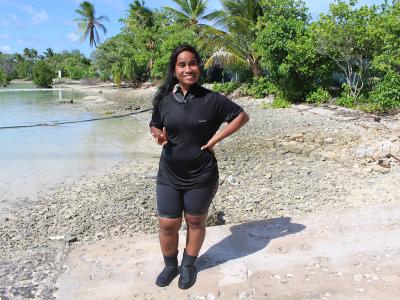
Photo:
Kiribati is a nation comprised of 33 atolls (21 inhabited) spread across a vast Pacific Ocean territory. The people of rural Kiribati are largely reliant upon a limited land base and coastal zone fisheries for both nutrition and livelihood.
As the population grows and climate change advances, the security of island resources will be challenged.
Already, the ecosystem integrity upon which islanders depend for climate change resilience is being eroded, in evidence in the deteriorating quality of near-shore fisheries, degraded lagoon health, and reduced freshwater quality. Climate change will exacerbate an already very high level of vulnerability.
With support from the GEF-Least Developed Countries Fund, this project (2016 - 2023) focused on building the adaptive capacity of vulnerable Kiribati communities to ensure food security under conditions of climate change.
- Community
- District
- National
- Country Office
- Ministry or Environment, Lands and Agriculture Development of Kiribati
- Global Environment Facility (GEF)
- United Nations Development Programme (UNDP)
Expected outcomes
Outcome 1: Institutional capacity developed to reduce vulnerability to climate change-induced food shortages
- Output 1.1: National program for informed decision-making
- Output 1.2: National Guidelines for Ecosystem-based Adaptation Management
- Output 1.3 National Coastal Zone Fisheries Monitoring and Conservation Awareness Program
- Output 1.4 National Coastal Zone Fisheries Conservation Regulation
- Output 1.5 Extension Officer Training
Outcome 2: Implementation of community adaptation measures to increase food security
- Output 2.1 Vulnerability Assessment and Monitoring Tool operational
- Output 2.2 Ecosystem-based Adaptation Management operational
- Output 2.3 Island and Coastal Zone Strategic Natural Resource Planning implemented
- Output 2.4 Island-based Coastal Zone Fisheries Monitoring and Conservation Awareness Program developed
- Output 2.5 Coastal Zone Fisheries Conservation By-Laws adopted
- Output 2.6 Climate Resilient Fisheries Management Practices demonstrated
- Output 2.7 Models for community-based tourism management demonstrated
The project objective was to build the adaptive capacity of vulnerable Kiribati communities to ensure food security under conditions of climate change.
To address these challenges and reach the project’s objective, the LDCF investment supported the realization of two components and related activities. Both components were closely aligned so that national and site-based activities are designed to build synergies, increase awareness, and generate much more informed and strategic use of natural resources so that ecosystem integrity is able to continue to function as the foundation of food security needs.
Under Component One, the project will assist Kiribati to address urgent institutional capacity building needs primarily on the national level. This will include helping to set in place an improved regulatory environment, strengthened institutional planning and policy frameworks, and generation of data required to support informed decision-making.
Under Component Two, the project will assist Kiribati to address climate change vulnerabilities by implementing and demonstrating community-based adaptation measures. The project will work on a select number of atolls to set in place models for land and lagoon resources management that is predicated upon informed planning and management processes. The general awareness of rural communities regarding fisheries management and climate change impacts will be increased. Community-based monitoring systems will be established. This will be used to inform decision-making, serve as an early warning system for climate change impacts, and be linked to island-wide vulnerability assessments. The monitoring system will linked to national level programming so that national level decision-making benefits from more broad-based information sources. The project will support the generation, adoption, and implementation of model council by-laws designed to be ecosystem inclusive and enhance ecosystem integrity. This will include model regulations for the management of fisheries, including permit and reporting mechanisms for both subsistence, commercial and tourism use of lagoon resources. The project will work with extension officers responsible for both agriculture and fisheries resources. This will include building the capacities of officers, responsible government agencies, island councils, and rural stakeholders through formal training programs utilizing fisheries field schools. Model programs for more sustainable and climate resilient practices will be tested, assessed, and ready for national replication.
All project activity will target the reduction of food security issues by setting in place capacities required for local communities to maintain and enhance ecosystem integrity. By project close, Kiribati should have operational models showing that food security, ecosystem integrity and climate change resilience can be enhanced through improved management approaches.
Outcome 1: Institutional capacity developed to reduce vulnerability to climate change-induced food shortages
- Output 1.1: National program for informed decision-making
- Output 1.2: National Guidelines for Ecosystem-based Adaptation Management
- Output 1.3 National Coastal Zone Fisheries Monitoring and Conservation Awareness Program
- Output 1.4 National Coastal Zone Fisheries Conservation Regulation
- Output 1.5 Extension Officer Training
Outcome 2: Implementation of community adaptation measures to increase food security
- Output 2.1 Vulnerability Assessment and Monitoring Tool operational
- Output 2.2 Ecosystem-based Adaptation Management operational
- Output 2.3 Island and Coastal Zone Strategic Natural Resource Planning implemented
- Output 2.4 Island-based Coastal Zone Fisheries Monitoring and Conservation Awareness Program developed
- Output 2.5 Coastal Zone Fisheries Conservation By-Laws adopted
- Output 2.6 Climate Resilient Fisheries Management Practices demonstrated
- Output 2.7 Models for community-based tourism management demonstrated
GEF CEO Endorsement: March 10, 2015
Project document signature: January 20, 2016
Inception workshop: July 8, 2016
Date of mid-term review: September 2020
Expected terminal evaluation report: January 2022
Expected project closure: July 2022
- UNDPMs. Azza AishathRegional Technical Advisor, Climate Change Adaptation
- Government of KiribatiMs. Tererei Abete-ReemaProject Manager




